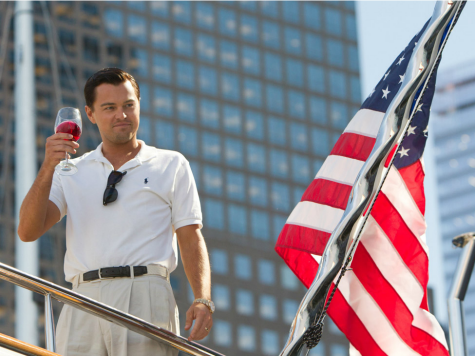
Martin Scorsese never stops his new, three-hour film The Wolf of Wall Street to sermonize against the evils of capitalism.
The Oscar-winning director is too good a storyteller to stumble into that ideological bear trap.
Instead, he lets the life of stockbroker extraordinaire Jordan Belfort speak on the theme’s behalf.
Leonardo DiCaprio is at his charismatic apex as Jordan, a raging id with the salesmanship to satisfy his earthly desires. Big houses. Beautiful women. Drugs. More drugs. More women. Jordan games Wall Street, smashing laws along the way, until he’s so rich he could buy and sell Gordon Gekko himself.
It’s an ’80s tale of greed that just so happened to occur during the ’90s even if President Bill Clinton is never name checked.
Wolf, based on Belfort’s memoir chronicling his rise and fall, remains sly concerning the messages it wishes to impart. Audiences can simply enjoy the dizzying ride, the layered comic performances (Jonah Hill, Matthew McConaughey) and DiCaprio’s most theater-rattling turn to date.
Jordan’s career begins with a pep talk from a Wall Street maestro (McConaughey) but spikes when he applies his knack for convincing strangers to ignore their economic interests.
Soon he’s a major player in the stock game, assembling a team of talented swindlers who know how to bilk innocents out of their fortunes. Scorsese doesn’t show us the victims of Jordan’s sales pitches. He’s too busy capturing the spoils of his hard work, most noticeably his stunning bride (Margot Robbie).
Our anti-hero’s ascent catches the attention of a blue-collar FBI agent (Kyle Chandler), a soul whose dedication to decency contrasts with the stockbroker’s profile.
Scorsese’s Goodfellas made the life of crime seem downright desirable, but the fall from grace felt by the main characters scared everyone straight. Wolf lacks that cautionary tale comeuppance–an echo of the maddening source material. It’s here where Scorsese the polemicist peeks his head into the frame.
Consider the visual of Chandler sitting on a subway train on the way to work compared to Jordan at the helm of his massive yacht. It’s worth far more than any op-ed Paul Krugman could pound out. And yet audiences may be too blissfully entertained to make such mental notes.
Wolf is so mesmerizing, so unbridled in its comic mojo, that the notion of greed gone wild barely registers at times. DiCaprio cajoles sad sacks into following his schemes with such alacrity you’ll fork over whatever cash remains after buying a soda and popcorn just to see what his plan might offer. The actor’s tutelage under Scorsese–this is their fifth collaboration–is one many won’t want to see end.
Not every trick trotted out by the wily director delivers. A subplot involving a shady French financier (The Artist’s Jean Dujardin) smacks of a slick plot device, and an extended Quaaludes sequence isn’t as funny as Scorsese likely thought.
The legendary director could be using The Wolf of Wall Street not to hector capitalism but call for stricter controls on those who shatter its good name. Or, he figured a movie calling out greed would serve him well in earning any awards not occupying his mantle.
Either way, The Wolf of Wall Street is a mesmerizing experience that transcends easy labels.

COMMENTS
Please let us know if you're having issues with commenting.